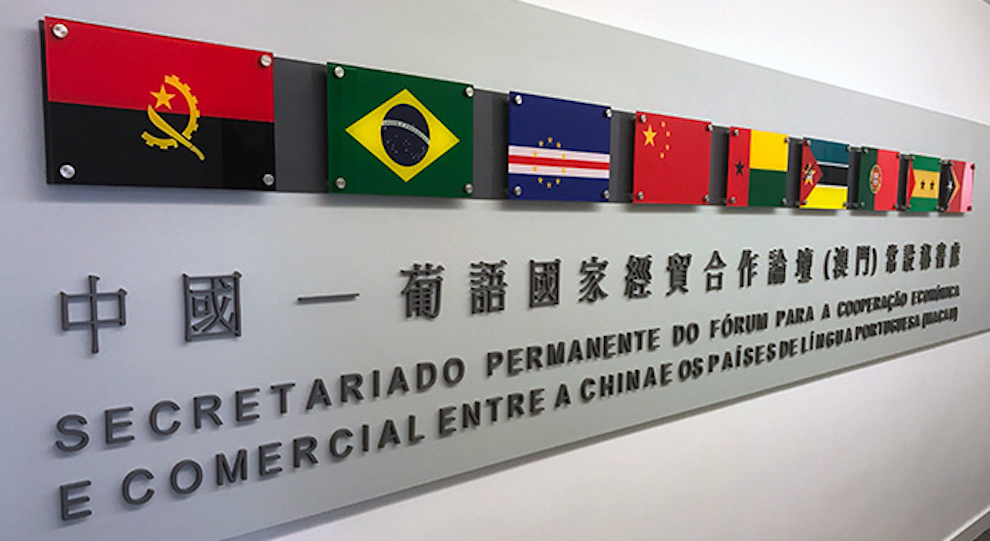The Support Office of the Permanent Secretariat of Forum Macao hosted on June 15 an exchange session between its Coordinator, Ms Teresa Mok, and local students.
The event took place in the library of Escola Luso-Chinesa Técnico-Profissional. The school’s Director, Dr. Ieng Lon Chan, also took part in the activity. It was attended by dozens of students attending the Chinese-Portuguese Translation and Interpretation Programme.
During the exchange, Ms Mok and Dr. Ieng delivered speeches on the advantages of Macao as a platform between China and the Portuguese-speaking Countries, and urged youngsters to put down roots in Macao and broaden their horizons.
Throughout the activity, Ms Mok engaged in a lively conversation with participants. She said she hoped such exchanges with students could help them deepen their knowledge about Forum Macao and about the role of Macao – and the city’s competitive advantages – as a platform between China and the Portuguese-speaking Countries. She also urged participants to make full use of their skills to help promote Macao as a platform between China and the Portuguese-speaking Countries, “putting down roots in Macao, supporting the motherland, and broadening their horizons”.
Forum Macao is marking the 15th anniversary of its establishment, with celebrations focused on promoting its achievements over that time, namely the positioning of Macao as a platform between China and the Portuguese-speaking Countries.
The exchange included the exhibition of a promotional video on the 15th anniversary of Forum Macao. Ms Mok also delivered a presentation on the structure of the Permanent Secretariat of Forum Macao; on the eight Portuguese-speaking Countries; and the advantages of Macao as a Service Platform for Trade Co-operation between China and Portuguese-speaking Countries.
During a question and answer session, Ms Mok explained – in an engaging and easily understandable way – the origins of Macao’s positioning as a Service Platform for Trade Co-operation between China and Portuguese-speaking Countries, and the benefits for Macao’s development of such positioning. Ms Mok highlighted a number of contributions to widening Macao’s role as a platform, including the promotion of: information sharing and exchanges regarding professionals bilingual in Chinese and Portuguese; and of business exchanges and cooperation between China and the Portuguese-speaking Countries.
She also highlighted several initiatives aimed at deepening Macao’s role as platform between China and the Portuguese-speaking Countries. They included: the Training Centre of Forum Macao; the Chinese-Portuguese bilingual talent nurturing base; the Centre for Cultural Exchanges between China and the Portuguese-speaking Countries; the so-called “Three Centres”; the nurturing by the Macao SAR Government of a financial industry with Macao characteristics; and the move to Macao of the headquarters of the China and Portuguese-speaking Countries Co-operation and Development Fund.
The students attending the Chinese-Portuguese Translation and Interpretation Programme and other youngsters that took part in the activity displayed great interest in Chinese-Portuguese translation and simultaneous/consecutive interpretation, and also in the respective lifestyle, culture and traditional crafts of the Portuguese-speaking Countries.
Ms Mok highlighted that Macao’s positioning as a platform between China and the Portuguese-speaking Countries had been set by the Central Government. She added that the Macao Government’s Five-Year Development Plan envisioned deepening of that role.
Ms Mok urged Macao young people to broaden their horizons, namely by: 1) planning their future carefully; 2) investing in lifelong learning, taking advantage of their language and cultural skills steaming from Macao’s role as a platform between China and the Portuguese-speaking Countries; 3) putting down roots in Macao and gaining detailed knowledge of Macao’s advantages as a platform between China and the Portuguese-speaking Countries, and therefore aiming to be part of Macao’s future and contributing to the city’s economic diversification and sustainable development.













